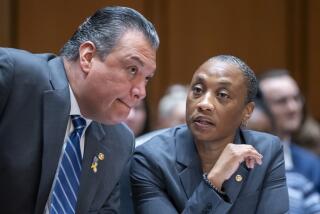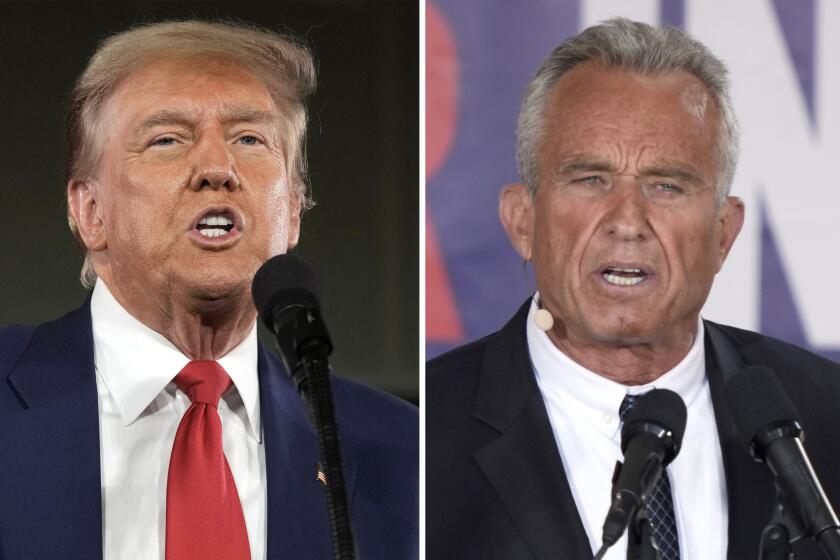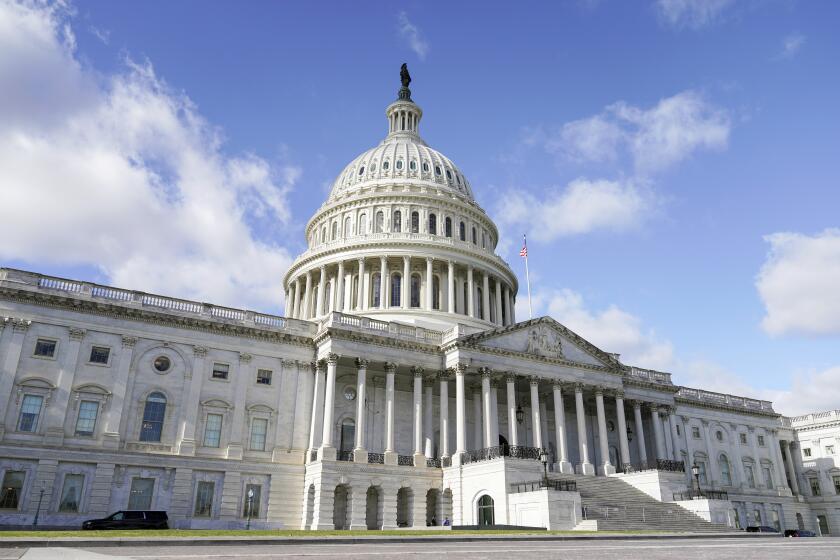U.S. Housing Aid at Risk, Israel Warned : Mideast: Peace talks and loan guarantees ‘are related issues,’ Scowcroft confirms.
While avoiding a direct linkage of U.S. aid for Israel to the Israelis’ acceptance of the Bush Administration’s Middle East peace efforts, President Bush’s national security adviser on Monday established that the two are tied to each other.
The comments by the official, Brent Scowcroft, national security adviser, represented a clear warning to Israel that by balking at participation in a peace conference, it is putting at risk $10 billion in U.S. loan guarantees to help finance construction of housing for Soviet immigrants.
Scowcroft spoke to reporters aboard Air Force One as Bush flew home from Istanbul at the end of a grueling nine-day trip to France, Britain, Greece and Turkey, only to begin preparations for a summit conference in Moscow, for which he is scheduled to depart next Monday.
Bush told reporters during the 11-hour flight home that the Middle East would be high on his agenda when he meets in Moscow with Soviet President Mikhail S. Gorbachev next Tuesday and Wednesday.
However, White House Press Secretary Marlin Fitzwater said that whether Bush and Gorbachev will be able to announce the convening of a Mideast peace conference depends on the progress made in coming days by Secretary of State James A. Baker III. On Monday, Baker wound up a hastily arranged Middle East tour and headed for Malaysia and a meeting of the Assn. of South East Asian Nations.
Scowcroft said Baker gave Bush a seven-minute Middle East update by telephone from his aircraft.
Scowcroft’s remarks on the peace conference and the housing guarantees, on which Israel is depending to help finance the massive construction required to provide housing for the flood of immigrants, were unusual in two respects:
They put direct, public pressure on Israel--something the Administration has generally been reluctant to do, although it is a tactic it has followed in recent days as Saudi Arabia, Syria and Jordan have each indicated support for at least parts of the Bush proposal. And, by making his comments on the record, rather than permitting them to be attributed only to a “senior Administration official,” he gave them added weight.
“What the President is talking about is no conditionality” between the aid and acceptance of the peace process, he said. But he then added: “They’re obviously associated. . . . There would not be a formal conditioning, but of course they are related issues.”
Bush has proposed two sets of related talks.
In one, Israel and its Arab neighbors would begin negotiations, under joint U.S.-Soviet sponsorship. On a parallel track, Israel would begin talks with Palestinians.
Under the Bush proposal, the United Nations could station an observer at the talks, who could take notes and report back to the U.N. Security Council but who could not otherwise participate.
Syria, in the past a key stumbling block, has accepted this arrangement, although the Syrians would give the United Nations less of a role than they originally wanted it to play. But the proposal has met with public rejection by Israel, even though Israel has not delivered a formal, official rejection.
In another area of disagreement, Scowcroft said, Bush recommended to both Syria and Israel that the conference could be reconvened by consensus of the parties, “which would mean Israel would have a veto.”
“The Syrians accepted that; that’s one of the things the Israelis have not accepted,” he said.
According to Scowcroft, Baker told Bush that “the Israelis took our proposals for the situation very seriously and said they would study them and then get back to us.”
He said the Israelis did not say when this would occur but that Baker told them that “time was important.”
Expressing concern that in the past Israel has said it would study a proposal, only to use the study period as a stalling tactic, the White House official said: “I don’t think we’re prepared for indefinite delay.”
Rather, he said, Bush would like this aspect of the issue resolved by the time he reaches Moscow next week.
Scowcroft also reported that Baker told Bush that the tone of his meetings in Israel was good, although the Israelis were “obviously . . . agonizing over what to do.”
Bush, he said, “is encouraged that there wasn’t a rejection.”
He said no one was surprised that Israel had not immediately responded to the acceptance of the Bush plan by Syrian President Hafez Assad with a positive answer too.
“It’s a pretty serious decision for them,” he said.
And, he said that failure to inaugurate a peace conference would not be “the end of the road, but it would require a change of tack.”
The Administration, Scowcroft said, recognizes that one approach remains the potentially awkward one of calling a peace conference and seeing who turns up, hoping that such a tactic would pressure all sides to take part rather than risk being seen as refusing to talk.
But, he added, “it’s pretty difficult to have a conference if one of the sides is not gonna be there.”
Leaving Istanbul, Bush announced at a departure ceremony that the United States would contribute $1 million to Turkish villages along the Iraqi border to help compensate them for economic losses during the Kurdish refugee crisis in the aftermath of the Persian Gulf War.
More to Read
Get the L.A. Times Politics newsletter
Deeply reported insights into legislation, politics and policy from Sacramento, Washington and beyond. In your inbox three times per week.
You may occasionally receive promotional content from the Los Angeles Times.






